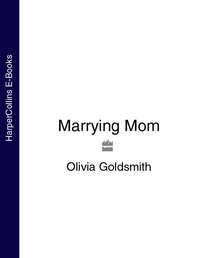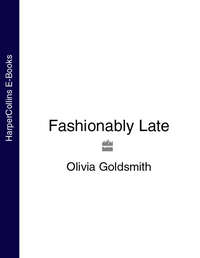
Полная версия
Wish Upon a Star

Wish Upon a Star
Olivia Goldsmith

For Millie Mohammad and her dear friend
Rose W. Ravid
…leaves all decisions up to us, including whether we wish to make any at all. It is up to us whether we wish to make any application to our life from a fairy tale, or simply enjoy the fantastic events it tells about. Our enjoyment is what induces us to respond in our own good time to hidden meanings as they may relate to our life experience and present state of personal development.
BRUNO BETTELHEIM
The Uses of Enchantment
The Meaning and Importance of Fairy Tales
Table of Contents
Cover Page
Title Page
Epigraph
ONE
TWO
THREE
FOUR
FIVE
SIX
SEVEN
EIGHT
NINE
TEN
ELEVEN
TWELVE
THIRTEEN
FOURTEEN
FIFTEEN
SIXTEEN
SEVENTEEN
EIGHTEEN
NINETEEN
TWENTY
TWENTY-ONE
TWENTY-TWO
TWENTY-THREE
TWENTY-FOUR
TWENTY-FIVE
TWENTY-SIX
TWENTY-SEVEN
TWENTY-EIGHT
TWENTY-NINE
THIRTY
THIRTY-ONE
THIRTY-TWO
THIRTY-THREE
THIRTY-FOUR
THIRTY-FIVE
THIRTY-SIX
THIRTY-SEVEN
THIRTY-EIGHT
THIRTY-NINE
FORTY
FORTY-ONE
FORTY-TWO
FORTY-THREE
FORTY-FOUR
FORTY-FIVE
FORTY-SIX
FORTY-SEVEN
FORTY-EIGHT
FORTY-NINE
FIFTY
FIFTY-ONE
FIFTY-TWO
FIFTY-THREE
FIFTY-FOUR
FIFTY-FIVE
FIFTY-SIX
FIFTY-SEVEN
FIFTY-EIGHT
FIFTY-NINE
SIXTY
SIXTY-ONE
SIXTY-TWO
SIXTY-THREE
SIXTY-FOUR
SIXTY-FIVE
SIXTY-SIX
SIXTY-SEVEN
SIXTY-EIGHT
SIXTY-NINE
SEVENTY
SEVENTY-ONE
SEVENTY-TWO
Acknowledgements
By the same author
Copyright
About the Publisher
ONE
Once upon a time in a magical city called New York a girl under a spell lived on an island.
It was Staten Island. And to get to work in Manhattan, Claire Amelia Bilsop had to commute almost two hours each way. She took a train from Tottenville, then a short walk to the ferry slip, then the ferry to Manhattan. She did it with her friend Tina and today was no different from most other days.
‘Oh, c’mon,’ Tina said. ‘Come with us. You never go anywhere and you’ve never done anything.’
Claire looked down at her knitting and frowned. When the ferry bumped against the pilings she had dropped a stitch. ‘That’s not true,’ she said, though in fact it pretty much was. She thought of her trips to the library, the video store, the wool department of Kelsey’s, all on Broad Street in Tottenville. ‘I have traveled broadly,’ Claire retorted, ‘and I come into Manhattan every day. Last summer I went to Long Beach Island.’
‘Long Beach, for god’s sake! In Jersey! And you went with your mother and that douchebag boyfriend of hers.’
Claire winced. Tina’s heart was in the right place but her mouth was in the gutter. ‘I prefer to think of him as a windbag,’ Claire said.
‘Douche, wind, whatever.’ Tina stuffed her magazine into her purse, fished out her sunglasses and stood up. Claire stood beside her. ‘Put that wool away, Granny,’ Tina told her and looked at her watch. Claire sighed. The ferry had docked and, as always, they had twenty minutes to walk up Water Street, get coffee and bagels from their regular street vendor, then be upstairs on the thirty-eighth floor of the Crayden Smithers Alliance Building. They had plenty of time but Tina always behaved like a child at a birthday party, afraid she wouldn’t get the last seat in musical chairs. As if anyone else would want their seats at Crayden Smithers. Claire picked up the dropped stitch, wrapped up her knitting, slipped into her coat and joined Tina and the crowd jostling to get off the boat.
As Tina pushed to the head of the line she pulled Claire in her wake. ‘Jersey, for Christ’s sake!’
‘I went to the Poconos,’ Claire murmured. People were looking at them angrily. Even in Manhattan, a city fabled for pushers, Tina stood out.
‘The Poconos!’ Tina almost spat as they stepped off the ferry. ‘That’s one step lower than Jersey.’ She shook her head and her big hair trembled. ‘And you went with that yutz. You didn’t even have sex with him.’
Claire colored. She looked around but the crowd paid no attention, busy dispersing to buses, subways, and a new day of boredom or aggravation. Claire’s sex life – or lack of it – meant nothing to them. ‘I slept with him,’ she protested. She wouldn’t admit to Tina that it had been mostly sleeping. Bob had not been an Italian stallion, as Tina always claimed her fiancé, Anthony, to be.
‘That’s even more pathetic,’ Tina said. ‘Sleeping with Bob. Fah!’ They stepped out of the terminal and the wind off the bay battered them. ‘Jesus, it’s cold,’ Tina complained. ‘It’s March, for god’s sake. When’s it gonna warm up?’ Claire knew Tina didn’t expect an answer so she didn’t venture one, letting Tina continue her ongoing monologue and possibly well-meaning harassment. ‘It’s warm in San Juan, Claire. Beaches. Casinos. Bars.’
The trouble was that Claire didn’t really like any of those things. She burned in the sun, she’d never gambled – not even on a Lotto ticket – and she hated bars. Though Tina had been her friend since they’d grown up on the same street in Tottenville, there wasn’t much that Tina enjoyed doing that didn’t make Claire bored or uncomfortable or both. People who lived in Manhattan referred to people like Tina as one of the ‘bridge and tunnel crowd’. Though they didn’t take a bridge or a tunnel to get to Manhattan from Staten Island, Claire felt this technicality wouldn’t affect Tina’s status. She was parochial, and not just because of her Catholic school upbringing. Claire hid a smile.
She often thought what a strange, ill-matched pair they made. Tina was tiny and dark, with big breasts she liked to be noticed and she wore bright, tight fitting tops. Her skin was olive and her make-up was dramatic. Claire was tall and, though fifteen pounds overweight, her chest was almost embarrassingly small – god must be a man because a woman god would not let all the weight she put on go to her hips. She had pale, fine skin and eyes that were somewhere between gray and green (but if she was honest – and she always was – closer to gray). Her light brown hair hung straight, cut below the chin in a simple bob. Aside from some pink lip gloss and an occasional (inept) wave of a brown mascara wand, she wore no make-up at all. Now the cold made her lick her lips and wish she’d brought the lip gloss with her.
The buildings on either side of them made a wind tunnel and Claire felt like Dorothy about to be battered by the tornado. Except, of course, there was no Oz. ‘If it’s about the money, hey, I got a few extra bucks,’ Tina offered. Claire blushed. She regretted telling Tina recently that her mother had begun charging rent. ‘Just for you to stay in the room you’ve slept in since you were four years old?’ Tina had demanded, outraged. Claire had nodded. Since Jerry had moved in, her mother seemed more short of cash than ever, though his contribution and the insurance money from her father’s death should have been more than enough for her mother to live on.
‘Ya know, it’s a sin the way your mom treats you. My uncle says if your dad left the house to you, you shouldn’t be payin’ no rent.’ Claire neither pointed out the double negative nor the fact that it was none of Tina’s uncle’s business. Of course, it sometimes seemed that Tina’s uncle – some of her other male relatives too – didn’t have a business. And their wives spent lots of cash and discussed everyone’s. But Claire never criticized – she knew what could happen to people who criticized Tony Brunetti. But if Tina was bossy, judgmental and a gossip, she did have a generous heart. ‘So, you want a loan?’ she asked.
‘No. It’s not that,’ Claire told Tina. They were only a block from the office but the chill was piercing. She tucked her chin down against the wind and tried to adjust her muffler – one she’d knit for herself – so that none of her throat was exposed. At least when they turned the corner, in sight of Sy’s pushcart, the wind abated.
‘Hello, ladies,’ Sy called out over the heads of the other customers on line for their morning caffeine and carbohydrate fix.
‘Hey, Sy!’ Tina replied. ‘Wanna go to Puerto Rico with me?’
‘Nah,’ Sy said. ‘I’d rather stand here in the cold, freezing my nuts off and doling out coffee to rich, cheap bastards.’
The rich cheap bastards on line were too busy reading the Journal headlines or talking on their cell phones to react, but Claire smiled.
‘Yeah. You got the life,’ Tina agreed. When she and Claire got to the front of the line Sy, without needing to be told, put their regular orders into two little bags. He handed them over to the girls with a flourish.
‘Tell ya what,’ he said. ‘I’ll ask my wife’s permission. But screw Puerto Rico. If she says yes we’re going to Aruba.’
‘If she says yes, I’ll buy Aruba,’ Tina wisecracked. ‘Then I’ll sell you the Brooklyn Bridge.’
‘Been there, done that. That’s why I’m pushing this cart,’ Sy said. He turned to Claire. ‘But maybe a cutie like you could sell me the Williamsburg.’ He winked.
Tina was rooting around in her gigantic purse. She looked up. ‘Geez, I barely have enough money for Danish and coffee. Hey, Claire, can you lend me a twenty till Friday?’
Sy, still looking at Claire, shook his head. ‘Same shit, ‘nother day,’ he smiled.
Claire nodded, opened her backpack and handed the bill to Tina. ‘Thanks,’ Tina said, and handed the twenty to Sy. ‘My treat.’
Claire smiled. That was so Tina. Always there with her hand out but always willing to share. She’d give you the blouse off her back – but she’d probably already borrowed your money to buy the blouse. Claire was the kind of person who always had money saved to lend to Tina – who was the kind of person who always needed to borrow some. Claire wasn’t old or experienced enough to know the whole world was divided into those two kinds of people, one never happy with the other. She just smiled at her friend as Tina handed Claire the bag of black coffee and a buttered bagel. As they walked from the cart, though, Claire did idly wonder why she was more comfortable lending than borrowing. It certainly wasn’t her mother’s influence. Her mother owed money not only to Claire but also to most of Tottenville. But neither did Claire remember her late father being open-handed with money. Perhaps she didn’t take after either one of them. Despite genetics she had always seemed completely unlike her parents or her brother Fred.
‘My brothers and Anthony went out last night and got hammered,’ Tina said. ‘Boy, were they hung this morning. They said they missed Fred. How is he?’
The truth was Claire had no idea how her brother was. He had joined the Army and had been shipped off to Germany. Claire had written to him dutifully for the first six or eight months after he left but he had rarely responded and when he did it was only with a brief postcard (no picture). As her letters became more and more difficult to write, Claire had admitted to herself that she and Fred never had much in common. So her letters had petered out. That didn’t mean that her guilt did. Aside from Fred and her mom she had no relatives she associated with. There was an aunt on her father’s side, but Claire had been told that the Bilsops had disowned her forever.
Tina, on the contrary, lived amidst scores of complex ongoing relationships: cousins, second cousins, their wives or husbands, godmothers, goddaughters, and dozens of courtesy aunts and uncles where no blood relationship existed at all. Sometimes Claire was turned off by Tina and her boisterous clan, but now and then she was envious of their closeness and even their feuds. You had to care about somebody to bother to fight with them. Now Fred was away, she only had her mother and Jerry, her mom’s repulsive boyfriend.
‘I guess Fred’s okay,’ Claire told Tina. ‘My mother got a card from Dusseldorf.’
‘Dusseldorf? Who’s he?’
Claire just shrugged. She’d decided long ago that educating Tina was not her job.
They arrived at the enormous glass doors to their office building with the usual couple of minutes to get upstairs. The lobby was crowded and the elevator was, as usual, jammed. The ride in the elevator was Claire’s least favorite part of the day. She had told herself over and over that it was only ninety seconds but she still dreaded it. In the summer people’s sweaty bodies were oppressive and in the winter the smell of wet wool was equally unpleasant. But it probably wasn’t the smell as much as the crush. All those strangers’ bodies rubbing. At that very moment Claire felt the breasts and belly of a large woman pushing against her back while in front, inches from her, she faced the wall of a man’s black coat, almost touching it with her nose. Her coffee had to be cradled directly against the tall man’s back. She was waiting for the day when the bag broke.
She was always relieved when the doors opened on the thirty-eighth floor and she could make her way out of what she thought of as ‘the aluminum sauna’. But her relief was almost immediately replaced by dismay as she remembered her next challenge: Once she had said goodbye to Tina she would have to scuttle down the rows of secretarial desks lined up outside the windowed offices which were ranged around the edge of the floor. Then she would have to turn and make her way down the windowless hallway that led to an even deeper corridor. It, in turn, would bring her to the interior room she shared with half a dozen other ‘analysts’, lorded over by Joan, a woman who proved that a little authority could make one a petty tyrant. Another day, another ninety-two dollars take-home Claire thought.
As they filed out of the elevator Claire hunched her shoulders in her habitual way but Tina, beside her, was jaunty, queen of the floor. How could she be so cheery? Maybe it was because Tina worked for Michael Wainwright, otherwise known as ‘Mr Wonderful’. Claire repressed a sigh at the thought of him. All the girls in the office talked about him. He was thirty-one, single, gorgeous, successful, and deeply in love … with himself. He had a hot- and cold-running stream of women, all of them financial executives in size six Prada suits. That wasn’t mentioning the shoes they wore, which cost more than Claire earned in a week. Michael dated them serially, replacing an investment banker with a broker with a fund manager. Secretaries like Tina and analysts like Claire were not his style. Many of them hated him, many admired him, but Claire was the only one who was in love with him. Of course, she wasn’t stupid enough to betray that information to any of her coworkers, not even Tina.
Michael Wainwright had spoken to Claire exactly four times in the eighteen months she’d worked at Crayden Smithers. The first time he’d asked, ‘Would you make five copies of this right away, please?’ The second time he’d said, ‘I need these numbers crunched by this evening.’ The third time – Claire’s favorite – was when she’d delivered a report to his office and he’d said, ‘Thanks. Nice dress.’ The last time was a little over two weeks ago when he had brushed against her on his way out to lunch and said, ‘Oh, sorry.’
They got to Tina’s desk. Claire glanced at the office behind her but couldn’t see Michael Wainwright. ‘I’m meetin’ Anthony tonight,’ Tina said. ‘We’re goin’ to the bridal registry at Macy’s. You wanna go?’
Claire doubted that even Anthony wanted to go. Was the choice that or garroting (something Tina’s uncle might know about)? She just shook her head. ‘No. I want to get home. I have a book to finish.’
Tina shrugged. ‘You and the books.’
Claire shrugged back and refrained from saying ‘You and QVC.’ Then she began the unpleasant route which made her disappear down the corridor like Alice down the rabbit hole.
TWO
‘He ain’t gonna get away with it. Someone should tell him ta get ovah himself,’ Michelle D’annunzio said.
‘Yeah,’ Marie Two agreed, then laughed. ‘But he thinks he’s so big he’d need to mountain climb to get ovah Mr Michael Wainwright.’
Michelle, Joan and Marie Two giggled. Marie One shook her head.
There were three Maries in the office – four if you counted Marie LaPierre, but nobody counted her – so the Maries were called One, Two and Three to avoid confusion. Two of them, along with Joan, Michelle, Tina and Claire, were having their lunch together. It was interesting to Claire to watch how the secretaries’ status was a reflection of whom they worked for. Marie One worked for Mr Bataglia who was middle management – nothing much – and she didn’t get much attention or respect. Marie Two worked for Mr Crayden, Junior who was one of the Craydens of Crayden Smithers. That meant Marie Two was considered much more important than Marie One or almost anyone else. Tina’s work for Mr Wonderful, the golden boy of the firm for the last few years, made her number two or three with a bullet. Michelle worked for the semi-retired David Smithers who was more a phantom than a physical presence. Everyone, it seemed, was more important than Claire, who only worked for Joan. It was a race Claire didn’t mind losing. She actually enjoyed watching the sudden shifts in power that change at the top wreaked on those at the bottom.
‘I don’t think he’s goin’ to get away with it this time,’ Marie One said. She put down her salami and egg sandwich. Then she picked up her Diet Coke and took a slug right from the can. Why, Claire wondered, did people who ate two thousand calories for lunch bother with diet sodas? Marie was still as large as the day that Claire first entered this lunchroom.
‘No. He ain’t,’ Michelle said, then took a bite of her triple-decker sandwich, followed by a potato chip. She didn’t have a problem with weight – she always had all the carbohydrates she desired and never put on an ounce.
‘Sure he will,’ Tina told them. She pushed some of her dark hair back over one ear and took a bite of her turkey club. ‘Hey, his social life is as busy as Grand Central Station, but I’m a great conductor. I keep all the different trains on separate tracks. They never crash into each other.’
Claire didn’t bother to point out that that wasn’t a conductor’s job. Actually, she thought the conductor analogy was an apt one but she would have used the metaphor of a symphony orchestra, not a commuter station. Michael Wainwright had a complicated and splendid private life that, without his knowledge, was public to all of the clerical women on the thirty-eighth floor.
Marie Two gave Tina a sour look. ‘Hey. Tell Mike Engineer that someday two of those engines will crash. And we’ll all be readin’ about it in the Wall Street Journal.’
Joan, the head of the analysts and – aside from Claire – the only woman at the table who wasn’t either a secretary or Italian-American, shook her head. She was a divorced single mother in her mid-thirties and, in Claire’s opinion, justifiably bitter. ‘From your lips to god’s ears,’ Joan said. ‘The bastard deserves it.’
But Claire didn’t think that was fair. Though Michael Wainwright certainly played fast and loose, he could afford to. It wasn’t just the looks, brains and schooling. He was also socially connected. Claire, via Tina, had an almost daily update on whom he was seeing, whom he was about to drop, whom he was adding to his conquest list, and where he was taking his latest date. Claire’s mental calendar, empty of engagements, was full of Mr Wonderful’s life. She wasn’t sure if Tina’s ongoing conversation was good or bad for her private obsession, but she certainly couldn’t ask Tina to stop talking without raising Tina’s always-acute suspicions when it came to romance. And it wasn’t as if Claire even dreamed of any real connection to Michael Wainwright. She knew he traveled in a world of money, entitlement, and the natural aristocracy of beauty and that she didn’t belong in any of those categories. Michael Wainwright was not a romantic possibility and she had no illusions otherwise. But it didn’t mean that she didn’t have feelings. She just kept them to herself. Her interest, she thought, was a kind of hobby – like bird watching.
Tina put down her sandwich and angrily wiped her mouth with a Subway paper napkin. ‘Why does he deserve it?’ she demanded of Joan. ‘He never promises any of them anything. They’re big girls. They can take care of themselves.’ Claire smiled. In public Tina was loyal to Michael but Claire knew that she sometimes warned him of the dating Armageddon that she so nimbly put off.
‘It’s time to get back,’ Joan said primly and looked at Claire. Claire nodded and put her untouched apple back into her bag. Unlike the others, Claire didn’t work for an investment banker. And reporting to Joan didn’t always make life pleasant. She stood up and smiled at Tina, who flipped a bird behind Joan’s back.
Claire’s afternoon was spent doing what seemed like endless revisions to spreadsheets of figures. The worst part about her job was also the best. There were no changes, no surprises, no peaks and valleys. She knew that as soon as she completed an assignment, Joan would hand her another one. Unlike Tina and the three Maries, Claire didn’t get to glimpse the drama going on in and around the windowed offices: she didn’t see the clients arrive, the meetings held in the glass-enclosed conference rooms. She didn’t witness the hirings and firings. But she heard all about them. Sometimes Claire felt her imagination was a better place to view the dramas than in reality. Tina was a kind of human radio – all Tina, all the time – and Claire saw the wins and losses, the corporate coups and the promotions and demotions more vividly in her imagination than if she had seen them in reality.
The problem was that she had time to daydream – too much time – and too many of her daydreams centered around Mr Wonderful. She wondered uncomfortably if it was becoming closer to an obsession than she admitted to herself.
While Claire had the title of ‘analyst’ she wasn’t much more than an educated clerk. Of course none of the secretaries were called secretaries, either. They were ‘Administrative Assistants’ (though they all expected gifts and flowers on Secretaries’ Day). But the two groups had something important in common: there was nowhere for either analysts or administrative assistants to advance to within Crayden Smithers. After a decade of service you weren’t promoted to investment banker. At best, you might get Joan’s job. Not that Claire wanted it. Joan was the sphincter muscle in the bowels of Crayden Smithers.







